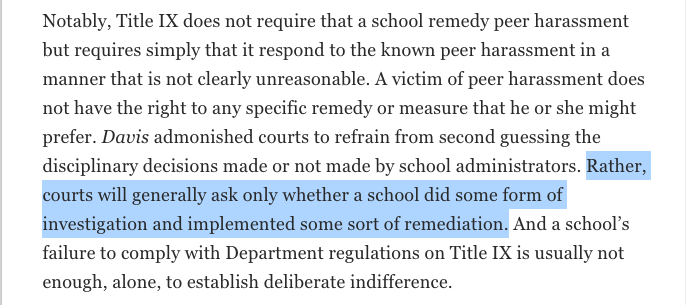Trump& #39;s SCOTUS nominee, Judge Amy Coney Barrett, has a troubling record on Title IX.
Let& #39;s break down her record and the impact on students and civil rights.
Let& #39;s break down her record and the impact on students and civil rights.
As our co-founder @azbrodsky shared, "Judge Barrett’s ruling turned a sex discrimination statute on its head, using a law meant to prevent and address sexual assault to promote impunity for that very same behavior." https://www.publicjustice.net/understanding-judge-barretts-opinion-in-doe-v-purdue/">https://www.publicjustice.net/understan...
To be clear, our concern with this case isn& #39;t her decision on the Doe& #39;s due process claim. But instead on her interpretation of Title IX and administrative enforcement of civil rights.
Let& #39;s dive into the case a bit.
Let& #39;s dive into the case a bit.
Doe, a student at Purdue, was suspended for a year for sexual misconduct. Doe claimed that his suspension was a result of anti-male bias, and therefore a violation of Title IX.
By Doe& #39;s own account, there was no evidence that the school had suspended him because of his sex.
By Doe& #39;s own account, there was no evidence that the school had suspended him because of his sex.
A district court dismissed Doe& #39;s suit, but ACB reversed the decision and allowed the case to continue.
In her decision ACB relied on "evidence that the school was trying to do right by survivors as evidence that it discriminated against men specifically."
In her decision ACB relied on "evidence that the school was trying to do right by survivors as evidence that it discriminated against men specifically."
Barrett suggested that ED& #39;s prior Title IX guidance, which outlined schools& #39; obligations to take sexual harassment seriously, supported a conclusion that a male student disciplined for sexual harassment was discriminated against based on sex.
ACB said since "a school& #39;s federal funding was at risk if it could not show that it was vigorously investigating and punishing sexual misconduct," it was possible that Doe had experienced bias.
But the unfair procedures that Doe alleged were prohibited by the 2011 guidance.
But the unfair procedures that Doe alleged were prohibited by the 2011 guidance.
In short, ACB claimed that a civil rights agency& #39;s action to stop discrimination is evidence of unfair bias against those accused of discrimination.
This is worrisome not just for Title IX, but all civil rights.
This is worrisome not just for Title IX, but all civil rights.
ACB also described the preponderance of the evidence standard as a “lenient” standard for survivors.
The preponderance standard is used in all civil rights proceedings and is the only standard of proof that treats both parties equally.
The preponderance standard is used in all civil rights proceedings and is the only standard of proof that treats both parties equally.
ACB& #39;s decision also further tips the scales against student survivors in the courts.
If a survivor alleges their school violated Title IX, they have to show the school treated them with "deliberate indifference."
If a survivor alleges their school violated Title IX, they have to show the school treated them with "deliberate indifference."
Deliberate indifference means a survivor has to show their school was clearly unreasonable in responding to the harassment.
This is an extremely high standard to reach. The survivor has to show their school intentionally or recklessly disregarded the outcomes of their actions.
This is an extremely high standard to reach. The survivor has to show their school intentionally or recklessly disregarded the outcomes of their actions.
Here& #39;s a great explainer on the Deliberate indifference standard if you want to learn more: https://www.jdsupra.com/legalnews/why-your-next-ocr-title-ix-complaint-10560/">https://www.jdsupra.com/legalnews...
ACB& #39;s "streamlined" reverse discrimination claims and her decision made it so students punished for sexual misconduct can bring a Title IX lawsuit by alleging facts that support a "plausible inference" that a school was partly motivated by their sex.
ACB& #39;s decision (and other& #39;s) have made it so bringing a case against your school as a respondent in Title IX cases is much easier than if you were a student survivor failed by your school.
Her decision isn& #39;t just concerning for student survivors, but all civil rights and their enforcement agencies.
Here& #39;s a great example of what ACB& #39;s logic could look like in action. https://www.publicjustice.net/understanding-judge-barretts-opinion-in-doe-v-purdue/">https://www.publicjustice.net/understan...
Here& #39;s a great example of what ACB& #39;s logic could look like in action. https://www.publicjustice.net/understanding-judge-barretts-opinion-in-doe-v-purdue/">https://www.publicjustice.net/understan...

 Read on Twitter
Read on Twitter



